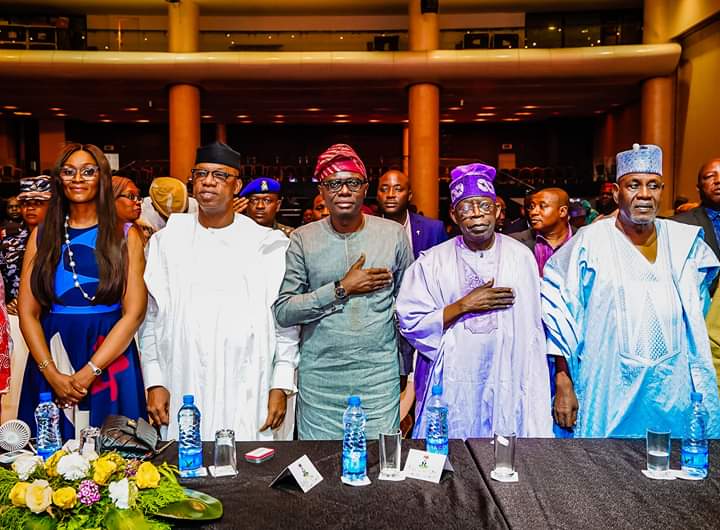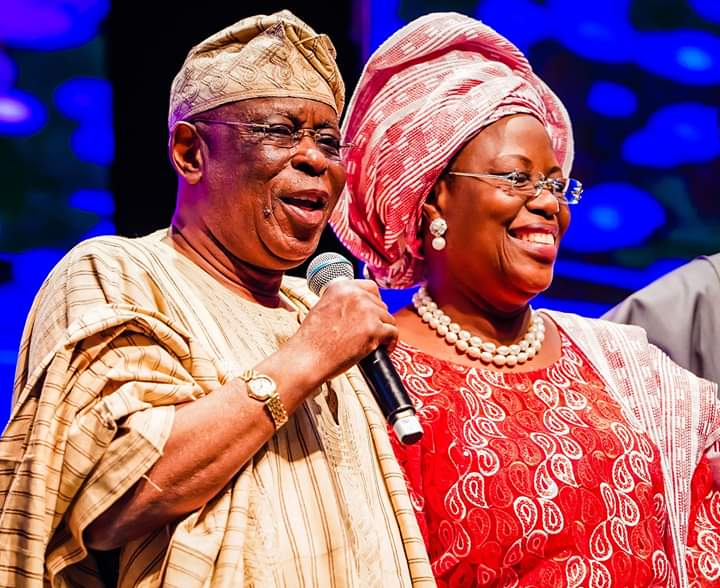 OFFICE OF THE VICE PRESIDENT
OFFICE OF THE VICE PRESIDENT
PRESS RELEASE
WE NEED TO FORM ALLIANCES ACROSS FAITHS AND ETHNICITIES TO DESTROY THE EVIL OF EXTREMISM THAT CONFRONTS US ALL – VP OSINBAJO
REMARKS BY HIS EXCELLENCY, PROF.YEMI OSINBAJO, SAN, GCON, VICE PRESIDENT OF THE FEDERAL REPUBLIC OF NIGERIA, AT THE PUBLIC PRESENTATION OF CHIEF OLUSEGUN OSOBA’S MEMOIR; BATTLELINES: ADVENTURES IN JOURNALISM AND POLITICS ON MONDAY, 8TH JULY, 2019.
PROTOCOL.
Chief Olusegun Osoba's illustrious career as a journalist and later politician, have also by some uncanny stroke of good fortune, placed him at the centre of many defining moments and situations of post-Independent Nigeria. Arguably the most memorable is his January 1966 scoop; the tragic discovery of the bodies of Prime Minister Tafawa Balewa and Finance Minister Festus Okotie-Eboh, not long after the coup that ended Nigeria's first Republic. He was there on the frontlines in many sectors of the Civil War, recording and reporting the horrors and tragedies of a factional war. And it was he who witnessed the surprise visit of Dr. Nnamdi Azikiwe to Lagos during the Civil War. He was also right there on the frontlines, nine years later with exclusive reporting during the coup that brought General Murtala Mohammed to power. He happened to be in the Governor's office in Enugu when the then Commissioner of Police, Kafaru Tinubu, sent word of the capture of Lt. Col. Bukar Dimka, the man who assassinated Murtala Mohammed. He was the only journalist to see Dimka in handcuffs in police custody in Enugu.
But his scoops went beyond the political, he exclusively reported the case of British born Patrick Chadwick, who slapped a Nigerian sales girl, Adekunbi Adeite, at the Kingsway Stores in Lagos (this despicable business of slapping women seems to have been around for a while), and how the UAC and some other journalists tried to cover it up. It became a national issue and the UAC eventually punished the culprit and he resigned. At different times, Chief Osoba ran two of Nigeria's most important and influential papers; Daily Times and Sketch, also The Herald, before joining a distinguished cast of journalists who went into and succeeded at politics, (I'm thinking of illustrious names like Dr. Nnamdi Azikiwe, Papa Obafemi Awolowo, Anthony Enahoro, Ladoke Akintola, Bola Ige, Lateef Jakande, Bisi Onabanjo, and many others.) He was there when General Ibrahim Babangida took over and was also at the centre of Abiola's campaign, from the Jos primaries to the annulment.
He was in the NADECO resistance. He was one of those hunted by the Abacha's strike force. I was the prosecuting Attorney General who led Sergeant Rogers in evidence when he described how they had trailed Chief Osoba in a bid to kill him. He was elected Governor under the Military Diarchy of 1990-92, and under the new civilian dispensation in 1999. He was in the opposition in its various iterations for all of 16 years and now in the ruling party. His life story is the insider’s view of the socio-political history of post-independence Nigeria. But perhaps the most remarkable attribute of this Illustrious Nigerian is his pan-Nigerianism; that effortless ability to build bridges and make friends from across various divides. That gift of connecting with people, earning their trust and confidence, of being able to get along with a diverse cast of Nigerians from all walks of life. This has evidently contributed greatly to the successes he has notched up in his twin careers of journalism and politics. There is a paradox here, the subtext of Osoba's autobiography "Battlelines: Adventures in Journalism and Politics," is the tragedy of ethnic and religious jingoism in Nigeria.
The collapse of our national achievements and attainments at every stage of our history has been that Achilles Heel, the tribal and religious suspicions. The inability at crucial moments, to bridge the gaps of ethnic and religious prejudice. So, from the execution of the coup of 1966, the countercoup, later that year, and the Civil War, starting in 1967, it is clear that these tragedies occurred because the once united Military wing of the Nigerian elite, finally gave way to its basest instincts - ethnicity and tribal prejudices. Years later, the scars and fractures remain.
Chief Osoba's story also tells us how the political elite also played the ethnic card to defeat, what would have been a national struggle for democracy; the struggle to restore MKO Abiola's mandate won by votes enthusiastically given by men and women of all tribes and faiths across the country, including the Kano home State of his opponent. But it wasn't difficult to begin a process of delegitimizing it. The tactic is the same and the consequences devastatingly effective: ethicize it. And so, they did. Northern Governors of the NRC, the party that lost the election, issued a statement saying that Abiola should be advised to give up his campaign for the restoration of the June 12th mandate, that any such restoration should begin with the restoration of the sacred mandate given to Shehu Shagari and forcefully taken from him in the wake of the 1983 Military coup. The Eastern NRC Governors had earlier issued a statement threatening a secession of the Eastern States from the rest of the country, if the annulment of the June 12 election was reversed.
The Military dictatorship took advantage of the ethnic divisions, to make it seem like a Southwest struggle for one of its own, rather than a struggle for democracy and justice, in the process imposing one of the most fearsome repressions of liberties anywhere in the world. Our recent history is the same. The religious or ethnic card is pulled out regularly to win the argument or the votes. The problem is that the resort to our fault lines is a cover-up for the failure of a vision and a genuine programme to address the real concerns of the millions of our countrymen and women. It also breaks our ranks and prevents the pursuit of our real enemies, poverty and its causes and manifestation, poor education and healthcare, violent extremism, etc. There are, for example, those who for political reasons, promoted the point of view that violent extremism of Boko Haram was the brainchild of the APC and its putative presidential candidate, a plot to Islamize Nigeria.
This wicked lie was only debunked when then General Muhammadu Buhari was attacked by the same Boko Haram, he barely escaped with his life and he lost seven close aides and relations. Not long after, the same group attacked the Emir of Kano who sustained serious injuries. In the lead up to the 2019 elections, similar accusations on the Boko Haram insurgency, the Fulani Herder and farmer clashes were made. The attempts by the political elite to delegitimize the government by the suggestions that it promotes insurgency are, of course, dangerous mainly because they help the insurgents by weakening the opposition to them.
What is the truth? As we have seen, there has been a curtailing of the threat represented by Boko Haram, but we have also seen other threats emerging; Islamic State West Africa (ISWAP) and others in the Lake Chad islands and parts of Southern Borno, radical Islamist terrorism, is an evil that must be seen as the common enemy of all faiths, including Islam. As the President said and I paraphrase, "anyone who says Allahu Akbar and goes on to kill is either insane or dangerously ignorant of the tenets of Islam." The likes of Boko Haram, ISIS, Islamic State West Africa Province (ISWAP) and many Salafist-Jihadist ideologies are expansionist ideologies that feed purely on hate, hatred of any person or group that does not belong to their particular sect. They have no redressible grievances, so there are no terms of reference for peace. They are fanatics committed to a twisted creed. They exploit the ignorance of the tenets of Islam, poverty and exclusion, recruit men and women and use children to perpetuate the most heinous atrocities.
They are motivated by a satanic desire to control communities by murder and terror. Whether it is in Iraq, Borno or Syria, their victims are men, women and children, Muslim or Christians, so long as they do not share their sick ideology, they target churches, mosques, markets and motor parks, where people gather, using children as human bombs to kill randomly, regardless of tribe or faith. I have seen the charred bodies of the dead men, women, children killed by suicide bombers in Gombe, Borno and Kano. The bombs are the ultimate agnostic destroyers, no discrimination in death. The challenge for us is to recognize this extremism for what it is. To form alliances across faiths and ethnicities, to destroy an evil that confronts us all. Every evil that confronts our nation and our people can be defeated by the power of unity; a recognition that we are stronger together than apart. Chief Osoba's life and times speaks most eloquently to the power of building bridges, finding common ground, and resisting divisive narratives, especially in a country as diverse as Nigeria, a country where it is extremely easy to find reasons to languish in stereotypes and suspicions, where far too many of us by default, lapse into ethnic camps.
Virtually every major actor in the Nigerian story over the last six decades shows up in the pages of Chief Osoba's book. He tells us and I quote from page 177 of the book, “There was no nightclub I did not visit with the likes of Babangida, Ike Nwachukwu, Air Marshal Abass, Air Marshal Bello and Sam Amuka, Moses Gowon, Fela Marsh, Alhaji Usman Nagogo, Ciroma Minna, Alhaji Bamanga Tukur, and Isyaku Ibrahim. We tagged Isyaku Ibrahim as the Godfather of our social circle of the era.”
Well, while I do not recommend night clubs, we must never underestimate the significance of interaction, and a willingness to understand the other person’s point of view.
Before I sit, let me say a word of prayer. At 90, God gave Abraham a mandate. God has given you a fresh mandate, you are only 80! I pray that as your days, so shall your strength, wisdom and favour with God.
Happy Birthday sir.
Released by:
Laolu Akande
Senior Special Assistant to the President on Media and Publicity
Office of the Vice President
8th July, 2019.











Comments
Post a Comment